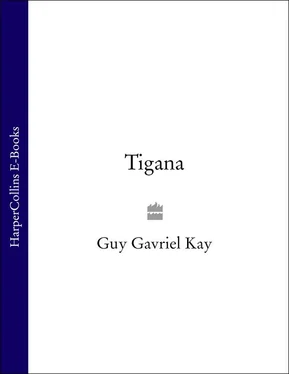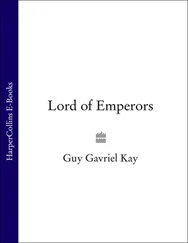At that thought Tomasso felt a nudge of apprehension within his rib-cage. He quelled it, as he had taught himself to do over the years—unbelievable how many years—of discussing such matters with his father.
But now Sandre was dead and he was acting alone, and the night they had laboured towards was almost upon them with this crimson waning of light. Tomasso, two years past his fortieth naming day, knew that were he not careful he could easily feel like a child again.
The twelve-year-old child he had been, for example, when Sandre, Duke of Astibar, had found him naked in the straw of the stables with the sixteen-year-old son of the chief groom.
His lover had been executed of course, though discreetly, to keep the matter quiet. Tomasso had been whipped by his father for three days running, the lash meticulously rediscovering the closing wounds each morning. His mother had been forbidden to come to him. No one had come to him.
One of his father’s very few mistakes, Tomasso reflected, thinking back thirty years in autumn twilight. From those three days he knew he could date his own particular taste for the whip in love-making. It was one of what he liked to call his felicities .
Though Sandre had never punished him that way again. Nor in any other direct manner. When it became clear—past the point of nursing any hope of discretion— that Tomasso’s preferences were, to put it mildly, not going to be changed or subdued, the Duke simply ceased to acknowledge the existence of his middle son.
For more than ten years they went on that way, Sandre patiently trying to train Gianno to succeed him, and spending scarcely less time with young Taeri— making it clear to everyone that his youngest son was next in line to his eldest. For over a decade Tomasso simply did not exist within the walls of the Sandreni Palace.
Though he most certainly did elsewhere in Astibar and in a number of the other provinces as well. For reasons that were achingly clear to him now, Tomasso had set out through the course of those years to eclipse the memories of all the dissolute nobility that Astibar still told shocked tales about, even though some of them had been dead four hundred years.
He supposed that he had, to a certain degree, succeeded.
Certainly the ‘raid’ on the temple of Morian that Ember Night in spring so long ago was likely to linger a while yet as the nadir or the paradigm (all came down— or up—to perspective, as he’d been fond of saying then) of sacrilegious debauchery.
The raid hadn’t had any impact on his relationship with the Duke. There was no relationship to impact upon ever since that morning in the straw when Sandre had returned from his ride a destined hour too soon. He and his father simply contrived not to speak to or even acknowledge each other, whether at family dinners or formal state functions. If Tomasso learned something he thought Sandre should know—which was often enough, given the circles in which he moved and the chronic danger of their times—he told his mother at one of their weekly breakfasts together and she made sure his father heard. Tomasso also knew she made equally sure Sandre was aware of the source of the tidings. Not that it mattered, really.
She had died, drinking poisoned wine meant for her husband, in the final year of the Duke’s reign, still working, to the last morning of her life, towards a reconciliation between Sandre and their middle child.
Greater romantics than were either the father or the son might have allowed themselves to think that, as the Sandreni family pulled tightly together in the bloody, retaliatory aftermath of that poisoning, she had achieved her wistful hope by dying.
Both men knew it was not so.
In fact, it was only the coming of Alberico from the Empire of Barbadior, with his will-sapping sorcery and the brutal efficiency of his conquering mercenaries, that brought Tomasso and Sandre to a certain very late-night talk during the Duke’s second year of exile. It was Alberico’s invasion and one further thing: the monumental, irredeemable, inescapable stupidity of Gianno d’Astibar bar Sandre, titular heir to the shattered fortunes of their family.
And to these two things there had slowly been added a third bitter truth for the proud, exiled Duke. It had gradually become more and more obvious, past all denial, that whatever of his own character and gifts had been manifested in the next generation, whatever of his subtlety and perception, his ability to cloak his thoughts and discern the minds of others, whatever of such skills he had passed on to his sons, had gone, all of it, to the middle child. To Tomasso.
Who liked boys, and would leave no heir himself, nor ever a name to be spoken, let alone with pride, in Astibar or anywhere else in the Palm.
In the deepest inward place where he performed the complex act of dealing with his feelings for his father, Tomasso had always acknowledged—even back then, and very certainly now on this last evening road Sandre would travel—that one of the truest measures of the Duke’s stature as a ruler of men had emerged on that winter night so long ago. The night he broke a decade’s stony silence and spoke to his middle son and made him his confidant.
His sole confidant in the painfully cautious eighteen-year quest to drive Alberico and his sorcery and his mercenaries from Astibar and the Eastern Palm. A quest that had become an obsession for both of them, even as Tomasso’s public manner became more and more eccentric and decayed, his voice and gait a parody—a self-parody, in fact—of the mincing, lisping lover of boys.
It was planned, all of it, in late-night talks with his father on their estate outside the city walls.
Sandre’s parallel role had been to settle visibly and loudly in to impotent, brooding, Triad-cursing exile, marked by querulous, blustering hunts and too much drinking of his own wine.
Tomasso had never seen his father actually drunk, and he never used his own fluting voice when they were alone at night.
Eight years ago they had tried an assassination. A chef, traceable only to the Canziano family, had been placed in a country inn in Ferraut near the provincial border with Astibar. For over half a year idle gossip in Astibar had touted that inn as a place of growing distinction. No one remembered, afterwards, where the talk had begun: Tomasso knew very well how useful it was to plant casual rumours of this sort among his friends in the temples. The priests of Morian, in particular, were legendary for their appetites. All their appetites.
A full year from the time they had set things in motion, Alberico of Barbadior had halted on his way back from the Triad Games—exactly as Sandre had said he would—to take his midday meal at a well-reputed inn in Ferraut near the Astibar border.
By the time the sun went down at the end of that bright late-summer day every person in that inn— servants, masters, stable-boys, chefs, children and patrons—had had their backs, legs, arms and wrists broken and their hands cut off, before being bound, living, upon hastily erected Barbadian sky-wheels to die.
The inn was razed to the ground. Taxes in the province of Ferraut were doubled for the next two years, and for a year in Astibar, Tregea and Certando. During the course of the following six months every living member of the Canziano family was found, seized, publicly tortured and burned in the Grand Square of Astibar with their severed hands stuffed in their mouths so that the screaming might not trouble Alberico or his advisers in their offices of state above the square.
In this fashion had Sandre and Tomasso discovered that sorcerers cannot, in fact, be poisoned.
For the next six years they had done nothing but talk at night in the manor-house among the vineyards and gather what knowledge they could of Alberico himself and events to the east in Barbadior, where the Emperor was said to be growing older and more infirm with each passing year.
Читать дальше












